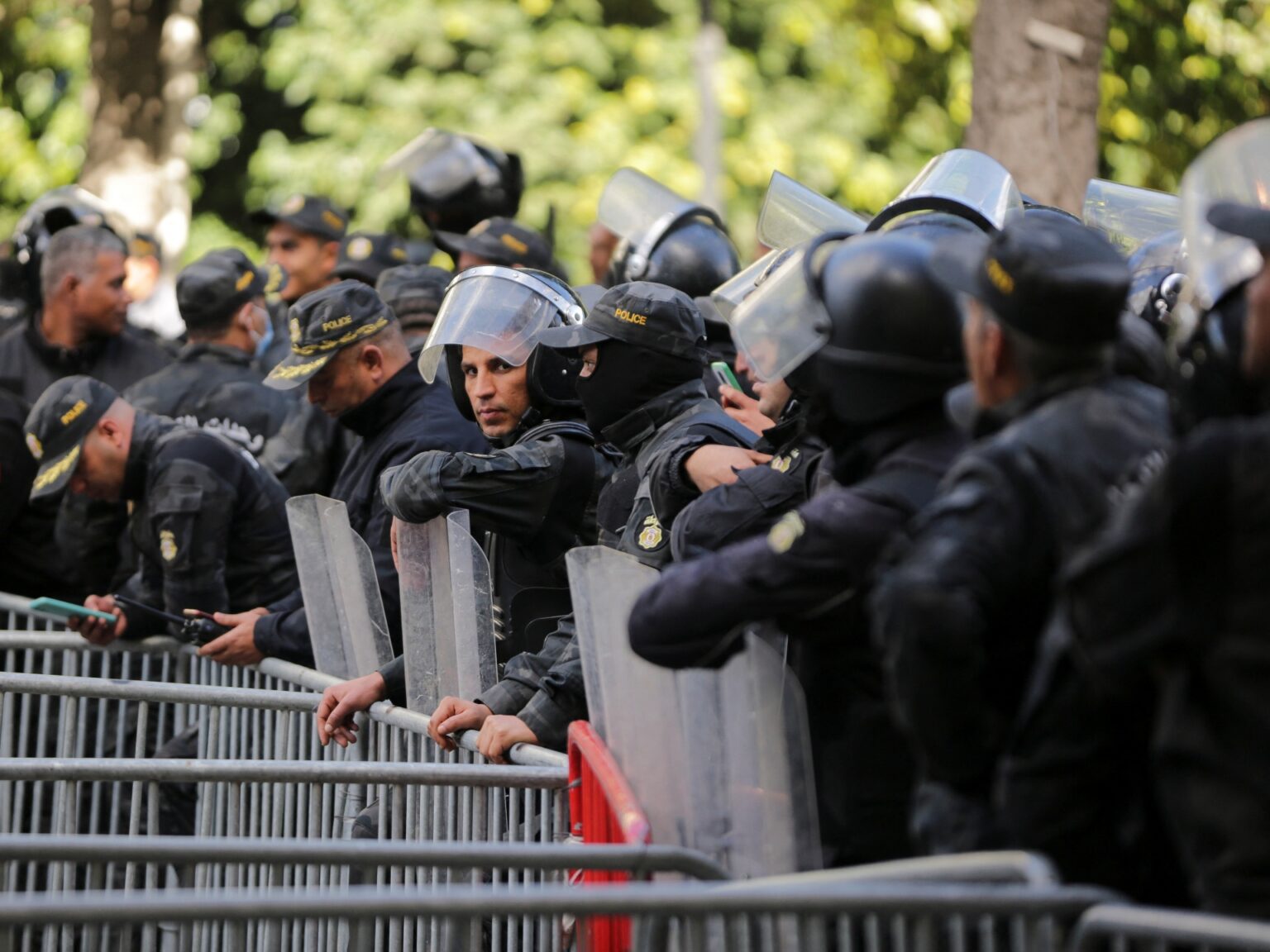Global Courant 2023-05-04 14:18:53
Tunis, Tunisia – Players fell in the middle of the basketball court and appeared to suffocate as tear gas poured into the arena.
The Tunisian basketball match between Rades and Club Africain, held in the capital Tunis on April 10, was violent, according to fans, as police clashed with supporters in the stands.
The tear gas eventually forced the game to an end.
Aymen Saadani, a 19-year-old student who attended the match, says he was seriously injured.
“Out of nowhere they threw tear gas at us. We tried to run away from the stands and they still beat us,” Saadani said.
The barriers in the stands gave way under the pressure of people trying to escape, causing hundreds of supporters to fall on each other, Saadani said.
“When I fell to the ground, I started praying. People were attacking me from everywhere. I am only 19 and I have seen death,” Saadani added, saying he was taken to hospital for treatment of his injured legs. “I can no longer work to pay for my studies. I can’t play football just because I was living my passion as a supporter.”
At least five supporters were injured during the match, according to Club Africain’s head of basketball.
But according to Saadani, police brutality is not new to Tunisian sport.
“The police are always insulting us and chasing us, often for nothing,” Saadani said. “We are just singing and supporting our club, we have no problem with it.”
The incident is not an isolated incident. In 2018, a dozen police officers were chasing a 19-year-old Club Africain supporter, Omar Laabidi, when he jumped into a river and drowned. The incident sparked several protests in Tunis.
Police also recently clashed with football fans during several matches in Tunisia’s national league, and in a continental match between Tunisia’s Esperance and Algeria’s JS Kabylie.
The confrontations at sporting events are just one example of a broader problem, activists and human rights activists said, and one that has grown under Kais Saied’s presidency.
The anti-corruption NGO I-Watch has reported that 70 percent of the police brutality cases it has recorded since 2011 have occurred since 2019, when Saied became president.
Saied has become increasingly authoritarian in recent years, especially since 2021, when he suspended parliament and dissolved the government, before changing the constitution to centralize power in his hands. Recently there has been a crackdown on the opposition, leading to several arrests.
Incidents of police brutality have led some Tunisians to say there has been no significant change in the security forces’ methods since the overthrow of President Zine El Abidine Ben Ali’s regime in 2011.
The protest movement that brought down Ben Ali had started after a street vendor was allegedly hit by a police officer, which many Tunisians say underlined the impunity with which the police have behaved.
The fall of Ben Ali created a democratic opening in Tunisia, but it seems to be fading.
“The police have been traumatized by the democratic era, they have lost a lot of influence and power,” said Monia Ben Hamadi, a political consultant and journalist who covered police brutality in Tunisia. “Human rights training was imposed on them. Now they are getting their power back.”
Ben Hamadi said security forces began to regain power under Hichem Mechichi’s government in 2021, when more than 2,000 protesters were arrested by police.
“At the time, President Kais Saied criticized the security forces and those arrests,” said Ben Hamadi. “Things have changed now as his regime is completely dependent on the police and military. Security forces are reclaiming their place in the police state. As we can see with the arrest of political opponents of Kais Saied, even justice is at the mercy of the security forces.”
Saied has made several speeches at the Interior Ministry in recent years, sending the message that the security forces are at the center of the state.
“The goal of a police state is to silence the youth,” Ben Hamadi added. “Young Tunisians who come from popular neighborhoods, such as football fans, pose a threat to the regime.”
Attacks on migrating sit-in
Just two days after the basketball game, police turned their anger on a sit-in held by migrants outside the offices of the United Nations High Commissioner for Refugees (UNHCR) in Tunis.
Sub-Saharan African protesters have asked to be evacuated to a safe country after Saied made comments in February saying migration was designed to change Tunisia’s demographics, in what the African Union called “hate speech.” The comments sparked a crackdown on sub-Saharan migrants living in Tunisia and an increase in racist attacks.
Police forces attacked the demonstrators on April 12 and had dismantled the camp by the next day, forcing the migrants to leave, according to witnesses. While chasing the migrants away, witnesses said some police officers used batons to beat the migrants.
The interior ministry accused the migrants of initiating the violence.
Adam, a Sudanese refugee who has been living in Tunisia for the past three years, told Al Jazeera he was injured in the clashes.
“Since we started the sit-in, the Tunisian police always tried to provoke us,” he said. “Many people were injured and the authorities detained them until there was no evidence of their injuries.”
Adam said he struggled to leave Tunisia as he faced many administrative obstacles.
But he no longer felt safe in Tunis.
“I just want to go to any country that treats me with dignity. Those clashes with the police mean that ‘human rights’ is just a slogan here,” Adam said.
The Interior Ministry did not respond to Al Jazeera’s questions but did accuse the protesters of throwing stones at the officers in a statement to local media.
The protesters now face jail time.
“They use the little damage to vehicles to make us look like bad people,” Adam said. “We protested for a month and we never caused any problems. Why should we start now?”








